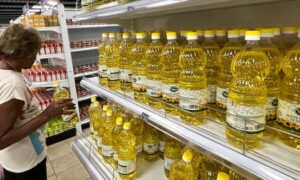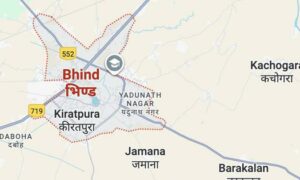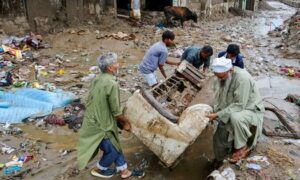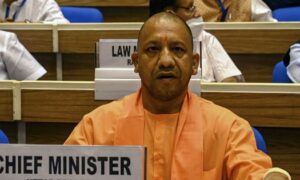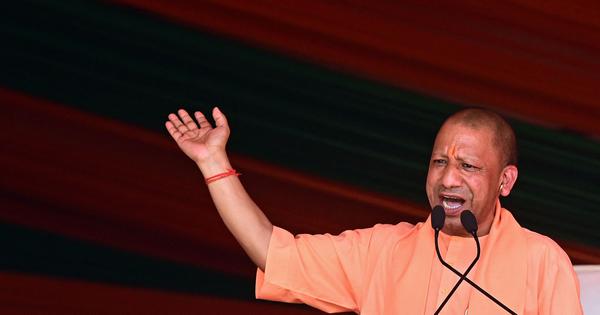
Uttar Pradesh Chief Minister Adityanath on Tuesday claimed that profits made through the sale of halal-certified products were being used to fund terrorism, “love jihad” and religious conversion in the country.
Love jihad is a Hindutva conspiracy theory that Muslim men trick Hindu women into romantic relationships with the aim of converting them to Islam. The Union home ministry has told Parliament that Indian law has no provision defining such a term.
Speaking at an event to mark the centenary year of the Rashtriya Swayamsevak Sangh, the Bharatiya Janata Party leader also claimed that transactions worth Rs 25,000 crore of halal-certified products were being carried out in the country.
The RSS is the ideological parent of the ruling BJP.
Halal is an Arabic term that means “lawful”. In the dietary context, where it is most commonly used, it refers to food that is permissible according to Islamic regulations.
In November 2023, the Uttar Pradesh government banned the sale, production, storage and distribution of halal-certified food items.
On Tuesday, Adityanath defended his government’s decision and claimed that even clothes and soap items were being sold with halal certification in Uttar Pradesh.
“No government agency has given this recognition to products,” said the chief minister.
He added that action would be taken against those “exploiting Indian consumers in the name of halal certification”.
After Uttar Pradesh’s ban, several petitions had been filed before the Supreme Court, including by Halal India Private Limited and Jamiat Ulama-i-Hind Halal Trust, challenging the constitutionality of the notification.
In January, the state government claimed in the top court that halal-certifying agencies were charging high fees, alleging the total amount collected through this process could amount to several lakh crores.
“So far as halal meat etc. is concerned, nobody can have any objection,” Solicitor General Tushar Mehta, representing the Uttar Pradesh government, had told the court. “But your Lordships would be shocked, as I was shocked yesterday, even cement used is to be halal-certified! Sariyas [iron bars] used have to be halal-certified…Water bottles which we get are required to be halal-certified.”
In response, the legal counsel for the petitioners argued that the Union government’s policy provided detailed guidelines for defining a product as halal, which applied to items other than meat.
Several countries have legal mechanisms to certify halal food, while in others private bodies provide the certification to companies.
In India, no legal authority provides halal certificates but some private organisations and religious groups do.
Manufacturers of food products usually seek the halal certificate for export purposes as it is a legal requirement in several Muslim countries.
Scroll had found that many products, though, find their way into the domestic market because manufacturers tend to cut costs involved in separate packaging. In the case of a vegetarian food product, the contents are exactly the same, and, more often than not, manufactured in the same production line.
Also read: How Uttar Pradesh’s halal ban has plunged the processed food industry into chaos
📰 Crime Today News is proudly sponsored by DRYFRUIT & CO – A Brand by eFabby Global LLC
Design & Developed by Yes Mom Hosting

